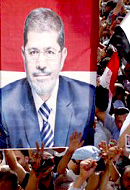|
Posted: 29 Jul 2012 03:14 PM PDT
(Paul Mirengoff)
Barack Obama and Benjamin Netanyahu have had their share of, shall we say, differences of opinion. The latest concerns the efficacy of sanctions against Iran. This morning on ABC, President Obama’s mouthpiece Robert Gibbs claimed that “we have made progress in delaying [Iran's] nuclear program.” “Our goal,” he added “is to prevent Iran from having a nuclear program and I think we’re making progress on that.”
But Netanyahu, the world leader with the biggest stake in making real progress on this front, doesn’t see any. He stated:
So who is right, the man whose country faces the prospect of a devastating Iranian nuclear attack or the man who needs to persuade American voters that he’s tough on Iran?
Well, let’s see. The Washington Post has declared that “The danger Iran will become a nuclear power is growing, not diminishing.” And the Wall Street Journalreports that the Obama administration has granted waivers from sanctions to all twenty of Iran’s major trading partners, including China. As the Journal explained:
But at least Obama is consistent. He attempted to water down the congressionally mandated sanctions before they were enacted. Now, he’s undermining them by granting waivers.
So I think we should take the word of Netanyahu, who has real skin in the game, not the word of the perenially duplicitous American president, whose only skin is political. The sanctions have not set back the Iranian program by one iota. Nor, Netanyahu could have added, was Obama ever serious about setting that program back.
|
The Muslim Brotherhood's Patient Jihad

Encouraging as these statements may be, in fact they accord neatly with the Brotherhood’s sophisticated strategy for dealing with outsiders. That strategy is laid out comprehensively in Mustafa Mashhur’s Jihad is the Way. Mashhur, leader of the Brotherhood in Egypt from 1996 to 2002, explains the movement’s religious beliefs and aspirations in detail—especially the role of violent jihad in bringing about a world under a unified Islamic Caliphate. It gives reason to doubt Morsi’s reassurances.
Jihad is the Way defines Israel and Israelis as “the criminal, thieving gangs of Zion,” and Mashhur stresses that the notion of Israel’s foundation on stolen land is not an opening position for negotiations, but a non-negotiable article of “faith and religion.” Further, the land was stolen not only from Palestinian Arabs but from Islam: "Know that the problems of the Islamic world, such as Palestine . . . are not issues of territories and nations, but of faith and religion. They are problems of Islam and the Muslims, and they can be resolved neither by negotiation nor by recognizing the enemy's right to the Islamic land he stole."
How can Morsi commit to keeping his country’s treaty with Israel when his religious beliefs preclude it?
As for the Brotherhood’s impending effect on the wider Arab world, Morsi’s "message of peace" is also not what it seems. Mashhur explains: "Jihad and preparation for jihad are not only for the purpose of fending-off assaults and attacks against Muslims by Allah's enemies, but are also for the purpose of realizing the great task of establishing an Islamic state, strengthening the religion, and spreading it around the world."
"Martyrdom for Allah," Mashhur writes, "is our most exalted wish." Jihad is indeed the way, and not only has Morsi never rejected this ideology—he is now its most senior political representative in Egypt.
So how are these contradictions to be understood? Why does Morsi talk peace when he explicitly adheres to an ideology of war?
The answer lies in the fundamental principles of the Muslim Brotherhood—principles largely overlooked in the West. As opposed to the ideology of al-Qaeda, which preaches continuous confrontation and attacks on infidels regardless of the immediate political costs, the Brotherhood places the highest priority on careful preparation and the strategic timing of political and military activity. Jihad is the Way stresses the necessity of timing the eventual jihad prudently; as a prooftext, it cites a Quranic passage in which Muhammad does not rush to fight until the timing is right:
Peaceful statements released from Egypt over the next few years should not deceive observers into believing that the Brotherhood has abandoned its religious ideology and its comprehensive Islamic vision. Talking peace, while preparing for jihad, is an integral part of jihad.
So when will Egypt break its treaty with "the criminal, thieving gangs of Zion"? Morsi will make the same calculation as Muhammad: when conditions are right.
Itamar Marcus is director and Nan Jacques Zilberdik is senior analyst of Palestinian Media Watch. They are the authors of Deception: Betraying the Peace Process.











 He was called the next Herzl, the next Dostoyevsky, the Jewish Garibaldi, the Jewish Churchill, the Prisoner of Acre, the Defender of Jerusalem, the Father of the Revolt, and the Father of the IDF. He wrote books, poems and articles. He founded armies and organizations. He was the voice of the downtrodden and was considered by some to be a modern day prophet, travelling around the world warning the people of impending destruction but never doubting their ultimate redemption. Yet, most Jews don’t know much about him or understand his impact on Jewish history.
He was called the next Herzl, the next Dostoyevsky, the Jewish Garibaldi, the Jewish Churchill, the Prisoner of Acre, the Defender of Jerusalem, the Father of the Revolt, and the Father of the IDF. He wrote books, poems and articles. He founded armies and organizations. He was the voice of the downtrodden and was considered by some to be a modern day prophet, travelling around the world warning the people of impending destruction but never doubting their ultimate redemption. Yet, most Jews don’t know much about him or understand his impact on Jewish history.


